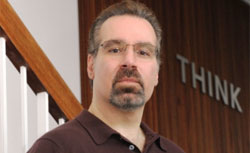A Q&A with David Ferrucci
The lead researcher for IBM's Watson project on bringing his supercomputer into the real world.

How is Watson being used today?
It's already changing how we think about business problems. Today in companies we have a spectrum that goes from full-text search—where people type in keywords and get thousands of documents back, many of them not important or relevant or don't answer your question—to classic database search, where you have very precise formal queries, but you have to prepare the data in a very structured way. Customers are looking at what we did with Watson as a sweet spot in between there. They don't have to put in as much energy to preparing their data, but they can get more precise value from it. We're working with them to develop applications in the area of health care, finance, tech support and other areas.
How will we use Watson in the future?
I think it's going to focus on higher-value queries, where people want to spend more time focusing on something—they're not looking for a URL. Watson will start to make people realize that there's a lot of information out there that we're just not getting to, because we're only looking at the top 10 documents. There are thousands or millions of relevant pieces of information that can affect your decision. Health care searches are a great example of this. That kind of search is an extended process, it's got recall blindness—which means you forget what you're not seeing, you don't know what you're not reading—and you suffer from not having the breadth of experience to understand [the results]. There's so much more the computer can do for you in situations like that.
Do you have a "Holy Grail" that you're working toward?
The Holy Grail for me is that you'll get intelligent dialogue with a machine, like on Star Trek. My minigoal toward that is a computer that will help in reading comprehension. Imagine: A third-grade or high-school student will sit down with the computer, and the student and the computer are both reading the text, and the computer could be pedagogical. Let's say the text is about dinosaurs. The computer could say, "They're asking for what kind of food a dinosaur eats, and I'm wondering if a plant is a type of food." Through that dialogue, the computer is getting smarter, [and] it's helping the student engage in critical thinking. For the first time, humans will be interacting with the machine in a fluent dialogue.
Return to Ferrucci's profile.
Read Ferrucci's essay on the challenges of designing a computer that can understand human language.
